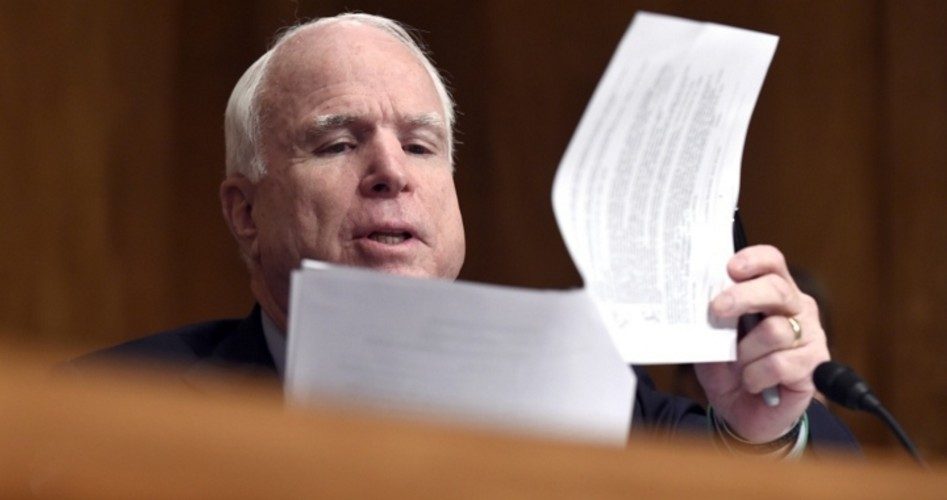
Senator and former Republican presidential nominee John McCain (shown) believes that if Republicans don’t pass “immigration reform” they can’t beat Hillary Clinton in 2016.
McCain said that former Secretary of State Clinton is the “the odds-on favorite right now,” to win the 2016 Democratic presidential nomination. Looking ahead to the next presidential election, the Arizona senator said, “I expect it to be very competitive, except if we don’t enact some kind of comprehensive immigration reform, I do not see a way for us to really win a general election.”
The Arizonan was speaking at the first event in the “Politics on Tap” series held at Sixth Engine, a Washington, D.C. bar, on the night of July 17. The event was hosted by National Journal’s Ron Fournier and CNN’s Jake Tapper.
When asked about the strong opposition among Republicans in the House to passing legislation similar to what the Senate passed last year, McCain said he will continue to “hope and pray and work” to make them reconsider.
“Hopefully my colleagues in the House will realize the same demographics that I am referring to and that they will at least in some way bring up immigration reform, whether it’s piecemeal, whether it’s one-at-a-time,” McCain said. “I think as the 2016 campaign gets closer that my colleagues will recognize … that we are marginalizing the Republican Party.”
By “demographics,” McCain was apparently referring to the fact that exit polls by the Pew Hispanic Center and other polls indicated that Latinos voted for President Barack Obama over Republican Mitt Romney by 71 percent to 27 percent in the 2012 election.
A poll taken in June by the by Latino Decisions for the Center for American Progress Action Fund found that 71 percent of Latino voters say it is very important or extremely important for Congress to pass immigration reform before the 2014 election, and 71 percent of Latino voters also say they would feel much or somewhat less favorable to Republicans in Congress if House Speaker Boehner (R-Ohio) fails to move an immigration reform bill to a vote on the House floor.
However, other national opinion polls indicated that many American have strong reservations about the “Gang of Eight”-drafted immigration bill (S. 744, the Border Security, Economic Opportunity, and Immigration Modernization Act) passed by the Senate on June 27, 2013. McCain was a member of the “Gang of Eight.”
A Rasmussen Poll taken last October indicated:
• Only 25 percent think it is even somewhat likely that the federal government will secure the border and prevent illegal immigration with new immigration legislation; 65 percent consider it unlikely.
• Only 18 percent think illegal immigrants should be given immediate amnesty; 62 percent believe legalization should occur only after the border is secured, and 19 percent are unsure.
• 40 percent favor the immigration bill passed by the Senate (S.744); 40 percent oppose it, and 20 percent are undecided. Support was down from 53 percent just one month earlier.
A Reuters/Ipsos poll taken in April 2013 showed that 53 percent of U.S. citizens believe that most or all illegal immigrants should be deported (30 percent most, 23 percent all), while 36 percent want all or most to stay (five percent all, 31 percent most).
A Rasmussen poll taken in July 2013 found that when told that the Senate immigration bill (S.744) would only decrease illegal immigration up to 50 percent of its current rate (according to the Congressional Budget Office) only 39 percent of U.S. likely voters supported the bill.
More recently, when a July 8-14 poll taken by the Pew Research Center asked, “With an increasing number of Central American children entering the country illegally,” what should the U.S. response be, 53 percent said we should speed up the deportation process, even if some who are eligible for asylum are deported.
As a member of the “Gang of Eight,” McCain naturally has a soft spot for the “immigration reform” bill that his committee drafted. But the bill has received strong criticism from members of his own party. Shortly after the bill passed the Senate, Sen. Ted Cruz (R-Texas) sent an e-mail to his supporters reading, “This is urgent. We must stop this Gang of 8 immigration bill, which would give amnesty to an estimated 11 million illegal immigrants with no guarantee of a secure border.”
Sen. Jeff Sessions (R.-Ala.) also expressed sharp criticism of the “Gang of Eight” bill soon after it was filed: “It’s hard to believe, but the Senate immigration bill is worse than we thought. Despite assurances, the border is not secured before almost everyone in the country illegally is given amnesty. The bill guarantees there will be a rush across the border to take advantage of massive amnesty.”
As we have seen, although the bill hasn’t been passed, the effective amnesty policy of the Obama administration that the bill would perpetuate has already caused a rush across the border. Therefore it is not surprising that Obama and McCain are on the same page when it comes to “immigration reform” legislation.
In contrast, former Texas representative and presidential contender Ron Paul, commenting on the recent influx of illegal immigrants across our borders that has dominated the news in recent weeks, wrote on July 16 that “most liberals and conservatives miss the point” when searching for a solution to the illegal immigration problem. Among the key factors responsible for the massive increase in illegal immigration, asserts Paul, is the U.S. “war on drugs.” He writes:
In fact, much of the problem can be directly traced to the U.S. drug war, which creates unlivable conditions in countries that produce narcotics for export to the U.S. Many of those interviewed over the past several weeks have cited violent drug gangs back home as a main motivation for their departure. Because some Americans want to use drugs here in the U.S., governments to the south are bribed and bullied to crack down on local producers. The resulting violence has destroyed economies and lives from Mexico to Nicaragua and beyond. Addressing the failed war on drugs would go a long way to solving the immigration crisis.
In the past, Paul has also blamed the generous welfare benefits available in the United States as an enticement for more illegal immigrants to cross our borders. He notes, again: “In a free society, where the warfare-welfare state ceased to exist, immigration laws would be far less important. A free market would seek workers rather than immigrants to add to its welfare rolls.”
The situation Paul described largely existed during the heyday of legal immigration, when the immigrants who were processed at Ellis Island and other locations were welcomed here because they provided needed labor and were willing to work because there was no alternative. There were no government handouts. It was either work, or go hungry.
Nothing in the “immigration reform” bill touted by Obama and McCain would restore the conditions that Paul described, which would constitute genuine immigration reform.
Photo of Senator John McCain (R-Ariz.): AP Images
Related articles:
Obama Admin. Blames Bush-Era Law for Failure to Deport Illegals
Former Border Patrol Agents: Illegal Immigration Crisis “Contrived”
Ron Paul Exposes Ill Effects of Illegal Immigrants on Hospitals
Key Players Comment on Immigration Crisis
Illegal Immigrant “Children” Include MS-13 Gang Members
Obama Opens Borders, Releases Illegal Immigrants Into U.S.
DHS: Flow of Illegal Immigrants Encouraged by U.S. Failure to Deport


